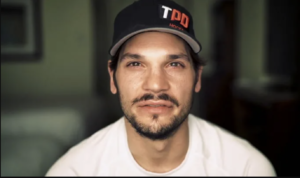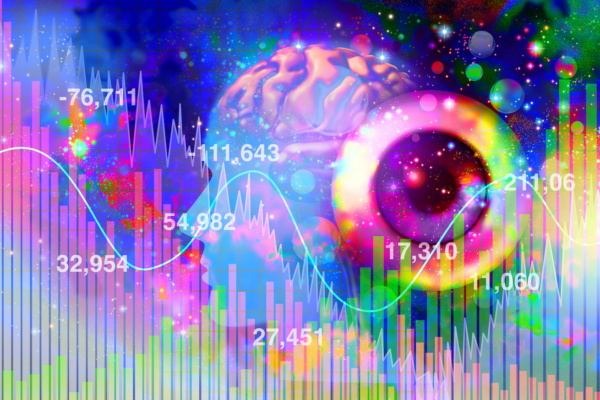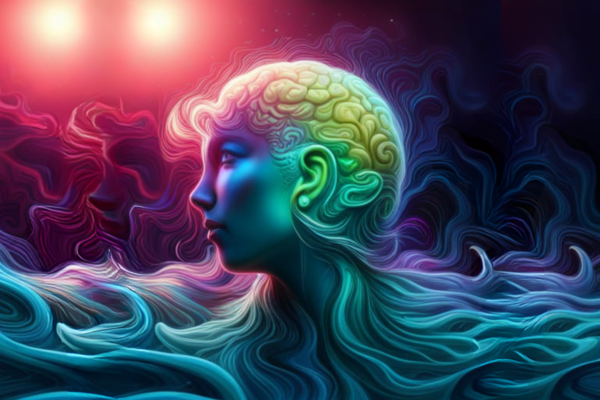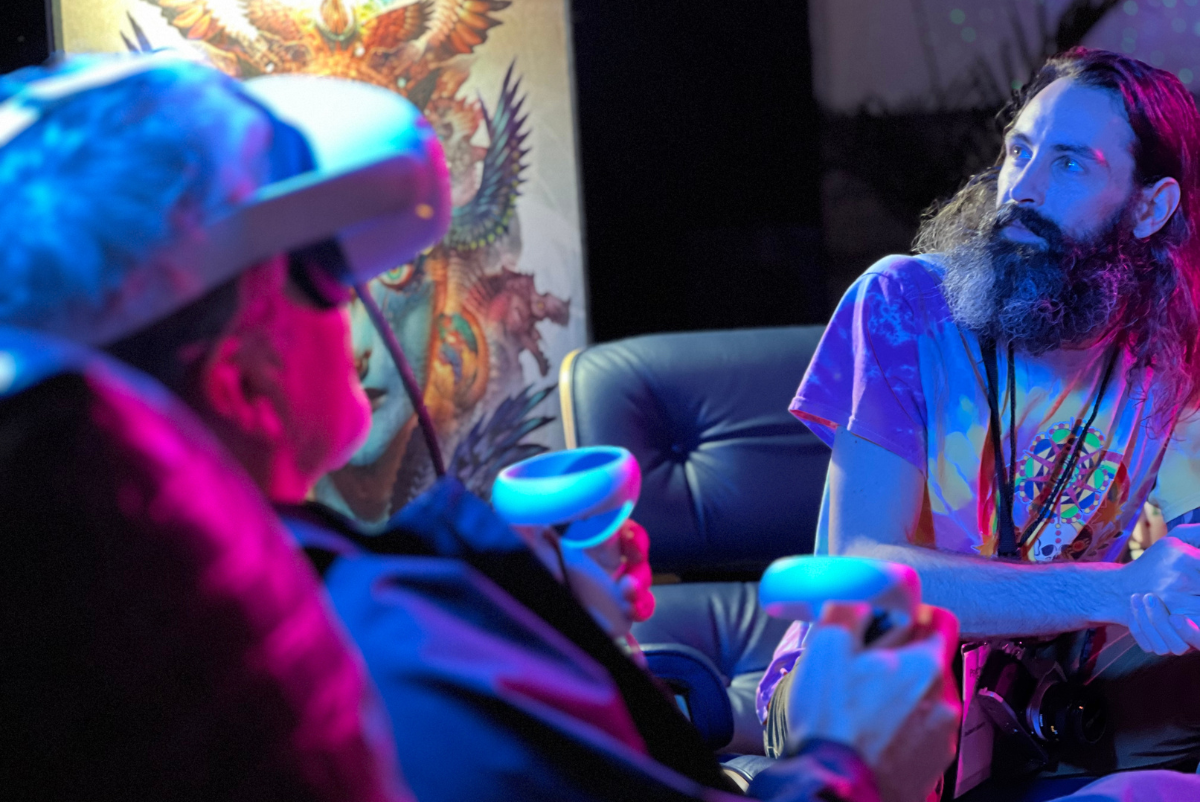
It is both ironic and hard to fathom that substances that have been linked to the creation of organized religions (Brian Muraresku, The Immortality Key) and have been a fabric of tribal and indigenous culture for millennia, are the topic of conversation at a 13,000-participant mainstream conference uniting business and industry, indigenous peoples, medicine and research, therapy and mental health, and society after the five-decade-long “war on drugs.”
It is no secret, and worth repeating: the war on drugs was not about drugs, but rather a targeted attack on people, aiming to marginalize, criminalize, and dehumanize cultures, socioeconomic classes, and people of color. Given our very recent history of inflicting trauma over psychedelic substances, it was inspiring to see these substances break down walls, create a sense of interconnectedness, and create a shared, felt (noetic) experience. It was as though gathering together en masse — talking about psychedelics and their myriad uses — was a psychedelic experience in and of itself. These medicines have that power, to exert their effect even when not ingested.
For five days, thousands of people gathered together in Denver to talk about psychedelics, and I was amongst them. A fitting site for a conference of this magnitude considering Denver was the first U.S. city to decriminalize “magic mushrooms.” The conference was sponsored by MAPS, and at the helm, founder Rick Doblin, Ph.D., did an exceptional job creating a diverse set of educational tracks that were jam-packed with content.
The biggest disappointment of the entire conference was the fact that you couldn’t be in every room at once — there were 11 separate stages — or attend any of the “unofficial” events that were happening alongside and after hours. But, what I can say is this event was more than education and content – it was a catalyst, an incubator, a moment in time to bring people, ideas, and cultures together.
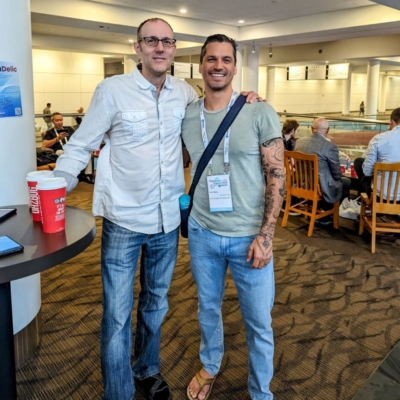
The stage was set by the opening remarks, with Rick Doblin sharing a historical context of the role of psychedelics in shaping culture and society and calling for “net zero trauma” by 2070. We saw the stage shared by opposing sides of the political spectrum with former Texas governor, Rick Perry, and current Colorado governor, Jared Polis. It was beautiful to witness a man who self-described himself as “the dark, knuckle-dragging, right-wing former governor of Texas,” admit that, “[his] reputation is not more important than these [veterans with PTSD] lives.” Regardless of one’s reasons for being there or political designation, it was both felt and understood that our society needs help; we need more answers, clear cooperation, better solutions, and new tools to bring to the table.
Psychedelic Avengers: Michael Pollan, Stanislov Grof, M.D., Ph.D, Gül Dölen, Ph.D, Melissa Etheridge, Julie Holland, MD, and more!
During the three days of plenary sessions, I marveled at the psychedelic equivalent of the Avengers give riveting keynote after keynote on all ranges of topics. Michael Pollan (How To Change Your Mind Netflix) moderated panels and signed his book (How to Change Your Mind). Stanislov Grof, M.D., Ph.D., (Holotropic Breathwork) was in attendance, as were multiple Grof Breathwork offerings, where he was honored for his multiple contributions to the psychedelic science. James Fadiman, colloquially known as “the father of microdosing,” presented compelling research, anecdotal and otherwise, on the vast array of conditions that could benefit from microdosing psilocybin, including autoimmune disease, human optimization and performance, creativity, adolescent mental health, neurodivergence, and many others. Gül Dölen, Ph.D., talked about her latest article on reopening social reward learning critical periods, which was met with a packed room and standing ovations. The most mind-blowing takeaway from this lecture was her statement, “psychedelics may be the “master key” for unlocking critical periods across the brain.” For those unaware, she achieved rockstar status after her work with MDMA and octopi that showed these asocial creatures could adopt prosocial behavior while on MDMA.
You may also like: Psychedelics and Brain Development: Psychedelics Reopen Critical Period for Social Reward Learning
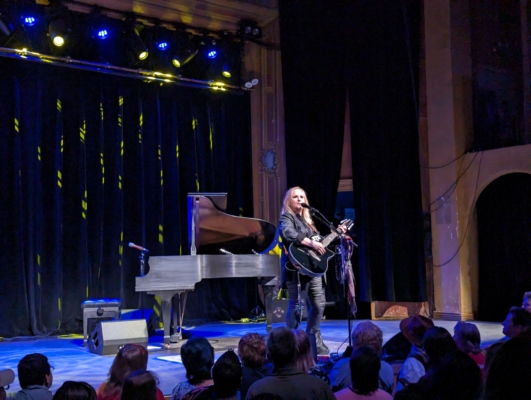
Actual rockstar, Melissa Etheridge, shared the stage with Julie Holland, MD, to talk about addiction, family, plant medicines, and healing. Her son, Beckett, died of a fentanyl overdose in Denver in 2020. An aspiring young snowboarder, he suffered a horrendous accident snowboarding in Colorado and was prescribed opiates for his physical pain. What wasn’t addressed was the emotional pain of losing his dreams to a possible traumatic brain injury. In response to the loss of her son, she created the Etheridge Foundation to find the best research and solutions to address opioid addiction. Melissa Etheridge is no stranger to “coming out,” as one of the early women to do so in a culture of intolerance. She has also openly shared her experiences navigating breast cancer treatment, talked publicly about sperm donation, and discussed her personal and sons’ struggles with addiction, as well as her own personal experiences with psychedelics. She is a brilliant and brave example of a celebrity using their platform to bring insight and awareness to these healing modalities and their potential.
Burners and business-people alike showed up to hear Marian Goodall, CEO of Burning Man, talk about building a culture on principles. What started as one man’s vision with some friends and a wooden effigy of a man at Baker Beach, CA, has turned into one of the most remarkable examples of community, ritual, and communion known to modern human.
Psychedelic superstars took over the Bellco Theater which held 5000 seats. Paul Stamets brought the house down in typical fashion, sharing his remarkable mastery of the psychedelic anthropological record while calling for accurate representation of the historically important women and indigenous healers that have contributed to the psychedelic movement.
Roland Griffiths, Ph.D., gave a keynote to an audience of 5000+ attendees about spirituality, mindfulness, and mortality – an existential topic he was forced to reckon with after being diagnosed with stage IV colon cancer. His heartfelt talk was a culmination of his life’s work, representing a metaphorical “passing of the baton” to the next generation of researchers, while maintaining a deep sense of mindfulness and gratitude for life. This may have been his last keynote ever given as he faces death head-on with curiosity and grace, just as he has approached all aspects of psychedelics and consciousness in his career as a researcher. Fighting back tears while offering his final words, he was met with a standing ovation from a room full of teary supporters, grateful for his brilliant mind and relentless curiosity. It was a beautiful moment to witness.
Andrew Weil, M.D., shared remarkable anecdotes from his more than 50 years of psychedelic exploration and use, some of which defy scientific or logical explanation but all of which informed and prepared him to be a pioneer in integrative medicine. In his exploration of all compounds, it is his humble belief that the most ancient and universally impactful psychedelics will be DMT and 5-MeO-DMT. Now, we must wait for science to catch up to prove what has been known by cultures for thousands of years.
It is clear that psychedelics, both as modalities of therapy and exploration of consciousness, and as a topic in the mainstream culture, are radical disruptors of the status quo. Ben Sessa, M.D., offered a short, but impactful plenary on the future of mental healthcare, with psychedelics at the forefront of novel treatment options and promising renewed hope. Lauren Taus, LCSW, in a brilliant, dynamic, and heartfelt manner, talked about psychedelics in the context of family, healing old wounds together, and the capacity of psychedelics to allow us to heal wounds in relationships long after an individual’s life has passed. She reminded us not to think of family as merely our nuclear families, but as our shared human family.
Neurodivergence and Family Systems
A much-needed spotlight on the topic of neurodivergence and psychedelics was given a stage and an opportunity to educate. Aaron Orsini, a brilliant autistic person, shared his personal experience with psychedelics—LSD (acid) and MDMA—on how they enhanced his ability to create social connections as well as process his trauma, confusion, and self-doubt from living in a world that holds neurotypical people as the standard and views autism as a disorder to be “corrected”. Autism is one of several diagnoses, or rather a constellation of symptoms, that falls under the category of neurodivergence, which includes other unique brain functional states such as ADHD, highly sensitive people (HSP), and others. The implication that psychedelics can help process trauma and enhance social connections for this community is profound.
Group dynamics and family systems were also given an important spotlight, with the incredible Adele Lafrance, Ph.D., sharing her work with Emotion-Focused Family Therapy (EFFT), psychedelics, and a variety of mental health challenges. What has become increasingly obvious is that treating an individual without addressing the family system is exponentially more difficult and oftentimes less successful. As Taus shared in her talk, she is “tired of treating fish in toxic waters. We don’t have a fish problem. We have a water problem.”
Celebrity Sightings
Celebrities took the stage to share their personal stories with psychedelics in a manner that respected the integrity of these practices. Aaron Rogers (Green Bay Packers Quarterback and MVP) on how ayahuasca changed his life, Melissa Ethridge (multiaward-winning, multi-platinum rockstar) on how psychedelics can help alleviate opioid addiction and transform suffering, Blake Mycoskie (founder of TOMS, co-founder of Madefor) on his $100M pledge to psychedelic research and access, and Alex Kopacz (Olympic gold-medal Canadian bobsledder) on promoting the medicinal use of plant medicines.
Honoring Indigenous Roots
As the final day came to a close, it was clear there was too much to take in. As Rick Doblin attempted to give his closing remarks of the conference, a group of indigenous protestors interrupted his speech. In what must have been an uncomfortable moment, he showed genuine leadership by maintaining his poise and allowing the protestors a platform, center-stage, to say what they needed to in order to be heard and seen. The protestors were rightfully angry for feeling as though their culture, traditions, and sacrifices were being dismissed, diminished, and disrespected. MAPS has been the sponsor of the event and has become the face of the psychedelic renaissance for the past four decades, but it is still relatively young when talking about the culture and sacrament of psychedelics. Representation is not just ensuring there is a “plant medicine track,” but also ensuring that the communities and cultures which have protected and practiced these medicines are given a voice in the conversations which shape their future.
I cannot imagine the challenges and scrutiny that Rick Doblin and MAPS must be facing, or what the indigenous communities who have long held and practiced psychedelic medicine as part of their culture must be feeling. But what is clear to me is that we cannot cannibalize each other. 13,000 attendees may feel like a sea of change, but it still constitutes a bubble in the bigger context of mainstream change. We remain a minority in a system that doesn’t want to see, or is actively resisting, change. A system that monetarily thrives on perpetuating disease and reliance on big pharma. Conversations between industry, medical experts, researchers, societal leaders, and indigenous peoples must occur within a container built on mutual trust and respect.We cannot shy away from these conversations, no matter how difficult, in order to continue to grow this movement, this medicine, and more importantly, a sense of hope that we can heal a sick society.
About Soul Surgeon MD | Dr. John Moos
John Moos is a Somatic and Psychedelic Healer, Physician, President, Guide, Husband, and Father who has had the privilege of helping and healing those in need for over two decades in the healing arts. Throughout this time—after four years leading healthcare teams as a trauma surgeon—he confronted and endured the greatest challenges of his life. During this period, having dedicated his life to the art and science of medicine, he felt called to put down his scalpel and find a new way to heal.
Aside from his professional licensure and medical training with Keck School of Medicine at USC + LA County Medical Center, he immersed himself in psychedelic and healing programs at California Institute of Integral Studies (CIIS), Psychedelic Research And Training Institute (PRATI), Multidisciplinary Association of Psychedelic Studies (MAPS), The Gottman Institute, and many other notable organizations. In 2019, he began his formal journey as a Soul Surgeon and, in 2021, opened his practice– Moos MD– a psychedelic healing sanctuary in Los Angeles, California. He specializes in trauma healing, mental health challenges, psychedelic education, SSRI tapering, and optimizing well-being.
Relying on his deep experience in all contexts of trauma, as well as his own journey through self-healing, he is able to apply the wisdom learned and earned from both professional and personal experiences to support every client’s healing journey. He continues to develop his work as a psychedelic healer, his healing framework and training curriculum for both clients and providers. His unique and humanistic approach lies at the intersection of medicine and mysticism and offers a pragmatic and accessible way to start your healing journey.
He is happily married to the love of his life and father to six incredible kids in a modern, blended family.
